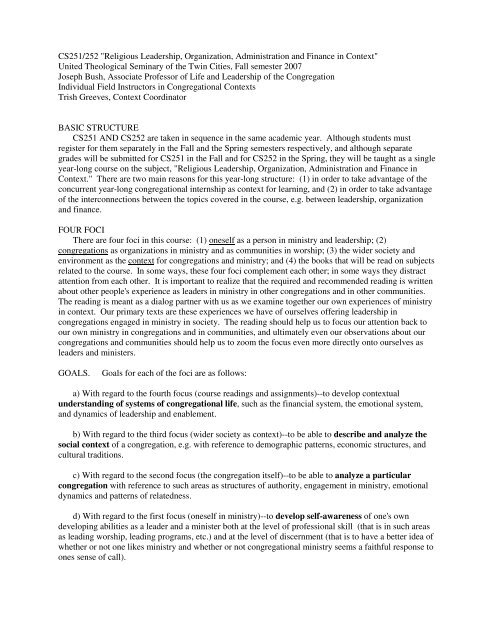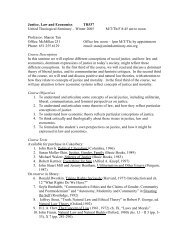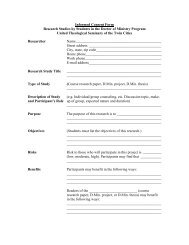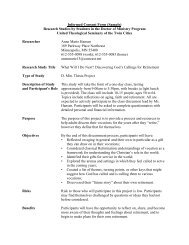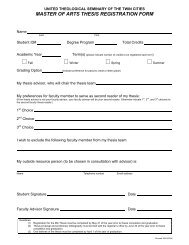CS251/252 "Religious Leadership, Organization, Administration and ...
CS251/252 "Religious Leadership, Organization, Administration and ...
CS251/252 "Religious Leadership, Organization, Administration and ...
You also want an ePaper? Increase the reach of your titles
YUMPU automatically turns print PDFs into web optimized ePapers that Google loves.
<strong>CS251</strong>/<strong>252</strong> "<strong>Religious</strong> <strong>Leadership</strong>, <strong>Organization</strong>, <strong>Administration</strong> <strong>and</strong> Finance in Context"<br />
United Theological Seminary of the Twin Cities, Fall semester 2007<br />
Joseph Bush, Associate Professor of Life <strong>and</strong> <strong>Leadership</strong> of the Congregation<br />
Individual Field Instructors in Congregational Contexts<br />
Trish Greeves, Context Coordinator<br />
BASIC STRUCTURE<br />
<strong>CS251</strong> AND CS<strong>252</strong> are taken in sequence in the same academic year. Although students must<br />
register for them separately in the Fall <strong>and</strong> the Spring semesters respectively, <strong>and</strong> although separate<br />
grades will be submitted for <strong>CS251</strong> in the Fall <strong>and</strong> for CS<strong>252</strong> in the Spring, they will be taught as a single<br />
year-long course on the subject, "<strong>Religious</strong> <strong>Leadership</strong>, <strong>Organization</strong>, <strong>Administration</strong> <strong>and</strong> Finance in<br />
Context." There are two main reasons for this year-long structure: (1) in order to take advantage of the<br />
concurrent year-long congregational internship as context for learning, <strong>and</strong> (2) in order to take advantage<br />
of the interconnections between the topics covered in the course, e.g. between leadership, organization<br />
<strong>and</strong> finance.<br />
FOUR FOCI<br />
There are four foci in this course: (1) oneself as a person in ministry <strong>and</strong> leadership; (2)<br />
congregations as organizations in ministry <strong>and</strong> as communities in worship; (3) the wider society <strong>and</strong><br />
environment as the context for congregations <strong>and</strong> ministry; <strong>and</strong> (4) the books that will be read on subjects<br />
related to the course. In some ways, these four foci complement each other; in some ways they distract<br />
attention from each other. It is important to realize that the required <strong>and</strong> recommended reading is written<br />
about other people's experience as leaders in ministry in other congregations <strong>and</strong> in other communities.<br />
The reading is meant as a dialog partner with us as we examine together our own experiences of ministry<br />
in context. Our primary texts are these experiences we have of ourselves offering leadership in<br />
congregations engaged in ministry in society. The reading should help us to focus our attention back to<br />
our own ministry in congregations <strong>and</strong> in communities, <strong>and</strong> ultimately even our observations about our<br />
congregations <strong>and</strong> communities should help us to zoom the focus even more directly onto ourselves as<br />
leaders <strong>and</strong> ministers.<br />
GOALS.<br />
Goals for each of the foci are as follows:<br />
a) With regard to the fourth focus (course readings <strong>and</strong> assignments)--to develop contextual<br />
underst<strong>and</strong>ing of systems of congregational life, such as the financial system, the emotional system,<br />
<strong>and</strong> dynamics of leadership <strong>and</strong> enablement.<br />
b) With regard to the third focus (wider society as context)--to be able to describe <strong>and</strong> analyze the<br />
social context of a congregation, e.g. with reference to demographic patterns, economic structures, <strong>and</strong><br />
cultural traditions.<br />
c) With regard to the second focus (the congregation itself)--to be able to analyze a particular<br />
congregation with reference to such areas as structures of authority, engagement in ministry, emotional<br />
dynamics <strong>and</strong> patterns of relatedness.<br />
d) With regard to the first focus (oneself in ministry)--to develop self-awareness of one's own<br />
developing abilities as a leader <strong>and</strong> a minister both at the level of professional skill (that is in such areas<br />
as leading worship, leading programs, etc.) <strong>and</strong> at the level of discernment (that is to have a better idea of<br />
whether or not one likes ministry <strong>and</strong> whether or not congregational ministry seems a faithful response to<br />
ones sense of call).
2<br />
e) This last matter of vocational discernment evokes a final, general goal: to be able to engage in<br />
theological reflection about oneself <strong>and</strong> about the church involved with others in context.<br />
METHODS<br />
The basic method for this course is critical reflection on practice. Such practice includes the social<br />
context as well as our personal experiences in congregations. Particular praxeological methods will vary<br />
with the kind of personal experience or social reality being studied. Much learning will be of an inductive<br />
nature--allowing unforeseen insight to emerge from myriad experiences <strong>and</strong> from the process itself.<br />
Course readings, h<strong>and</strong>outs, lectures <strong>and</strong> consultations with field instructors will provide various resources<br />
for help with our praxeological reflection as practical theologians. Basic methods are especially<br />
introduced during the first weeks of the course. In addition, particular approaches to contextual study are<br />
given in the assignments for each week. Individualized learning is also encouraged in the field contexts,<br />
<strong>and</strong> a worksheet for constructing an individualized learning agenda is provided in the <strong>CS251</strong>/<strong>252</strong> packet.<br />
ADDITIONAL MATERIALS<br />
In addition to this syllabus, there is a packet of materials for <strong>CS251</strong>/<strong>252</strong> including a H<strong>and</strong>book for<br />
<strong>CS251</strong>/<strong>252</strong>. The packet <strong>and</strong> the H<strong>and</strong>book contain: (1) statements of policy; (2) additional explanation<br />
of contextual studies <strong>and</strong> congregational internships, (3) clarification about roles, responsibilities, <strong>and</strong><br />
relationships between intern, field instructor, <strong>Leadership</strong> Advisory Group, <strong>and</strong> the seminary, <strong>and</strong> (4)<br />
worksheets to facilitate the process. The worksheets relate to: (a) the initial process of establishing<br />
learning goals <strong>and</strong> a learning agenda, <strong>and</strong> (b) a process for mid-semester <strong>and</strong> final evaluations. All these<br />
materials are also available on the “<strong>CS251</strong>/CS<strong>252</strong>” link on the Contextual Studies website:<br />
http://mercury.unitedseminary-mn.org/context. In addition, see the UTS Student H<strong>and</strong>book for other<br />
relevant policies, such as that on extensions <strong>and</strong> inclusive language [2007-2008 edition, pp. 42, 108-9]<br />
ASSIGNMENTS<br />
Both reading <strong>and</strong> writing assignments are detailed in the schedule below. For the Fall semester, a<br />
brief written assignment is required each week; in the Spring semester, there will be longer assignments<br />
but fewer in number. Students are advised to stay well ahead in the assigned reading--reading the<br />
material as early in the week as possible (or even in advance of the week concerned). The written<br />
assignments follow from the reading <strong>and</strong> serve to focus attention more concretely on a particular<br />
congregation in context. In most instances, one will need to pursue the week's field work with the reading<br />
<strong>and</strong> written assignments in mind.<br />
SITE VISITS<br />
Once during the year—in either the Fall semester or the Spring semester or even during the Jan.<br />
term—students should arrange for a site visit to their congregations by Trish Greeves or Joe Bush. The<br />
timing of these site visits can vary according to need <strong>and</strong> circumstance. Students are asked to request a<br />
time when a site visit might be most helpful to them. Some students may want to time this site visit early<br />
in the Fall in order to help clarify the process or to facilitate goal-setting. Other students, however, may<br />
want someone from the seminary to be present late in the semester in order to assist with final<br />
evaluations. Still other students may want someone from the seminary to be present at different times in<br />
order to observe an event in ministry, e.g. the student preaching a sermon, etc. These site visits should be<br />
planned as soon as possible, though, even if for the end of semester. Also Trish Greeves <strong>and</strong> Joe Bush are<br />
often not able to find Sundays free if asked just one or two weeks ahead of time. Weekday <strong>and</strong> evening<br />
invitations are encouraged. A typical site visit includes three aspects:<br />
1) A meeting with the <strong>Leadership</strong> Advisory Group;<br />
2) A meeting with the field instructor (sometimes simply included in the LAG meeting);<br />
3) Observation of you as the intern engaged in some form of leadership or ministry.<br />
This meeting is for the intern’s benefit--to facilitate supervision & feedback for the intern in the<br />
ministerial context. Interns should take the initiative in organizing this site visit, setting the agenda <strong>and</strong>
chairing the meeting of the <strong>Leadership</strong> Advisory Group (though some field instructors take a more active<br />
role in sharing leadership at these meetings than do others). Typically, the visitor from the seminary is<br />
asked to help to interpret the program as a whole as well as to explain the role of the LAG in particular.<br />
EVALUATION<br />
<strong>CS251</strong>/<strong>252</strong> is taken for Pass/No Credit rather than for letter grades. While particular assignments will<br />
be evaluated <strong>and</strong> marked with either a percentage grade or a letter grade, the final grade for each semester<br />
will be simply a Pass or No Credit. While the professor is responsible for determining <strong>and</strong> submitting the<br />
final grade for each semester, he does so taking into account field evaluations from the field instructors,<br />
members of a student's <strong>Leadership</strong> Advisory Group, <strong>and</strong> the students' own self-evaluations.<br />
Approximately half (50%) of the grade for each semester will be based on a student's field evaluations;<br />
one quarter (25%) of the grade will be based on class participation; one quarter (25%) of the grade will be<br />
based on the written assignments described in this syllabus. For the Fall semester, there are ten small<br />
written assignments weighted equally (2.5% per assignment). In the Spring semester, there will be five<br />
assignments equally weighted at 5% each.<br />
Field evaluations are due on the following dates:<br />
October 19, 2007 Mid-semester evaluation to be mailed in by field instructor.<br />
December 18, 2007 End-of-semester evaluations to be turned in by interns.<br />
March 7, 2008 Mid-semester evaluation to be mailed in by field instructor.<br />
May 9, 2008 End-of-semester evaluations to be turned in by interns.<br />
CLASS PARTICIPATION <strong>and</strong> SMALL GROUPS<br />
Class participation is crucial for the learning process as we discuss together our experiences in<br />
ministry <strong>and</strong> leadership. Class participation includes: (1) being prepared to discuss reading <strong>and</strong><br />
assignments for the week concerned; (2) ability to offer constructive <strong>and</strong> honest feedback to one's peers in<br />
conversation; <strong>and</strong> (3) being able to reflect honestly <strong>and</strong> openly on one's own ministry in conversation with<br />
others--that is to receive as well as to offer feedback; (4) respect for fellow-participants <strong>and</strong> nondisruptive<br />
patterns of interaction; <strong>and</strong> (5) punctuality with regard to beginning <strong>and</strong> ending times--<br />
including the time allotted for breaks. Each student will be assigned to a small group to facilitate<br />
discussion of students' case material, evaluations, <strong>and</strong> other assignments; these groups will be facilitated<br />
by Joseph Bush <strong>and</strong> Trish Greeves.<br />
CONFIDENTIALITY<br />
Some of the material discussed in class is of a confidential nature <strong>and</strong> should not be discussed outside<br />
of class. This is not so, of course, for lectures <strong>and</strong> discussion of the reading, but it is so for real-life case<br />
studies <strong>and</strong> disclosures by fellow students of their experience in ministry <strong>and</strong> the experiences of their<br />
congregants. Even in the context of the seminar itself, the identities of individuals mentioned in case<br />
studies should be disguised as well as possible. It would be most troubling if an individual congregant<br />
heard through round-about channels that she or he was being discussed as a "case." Also, we must<br />
recognize that interns are variously vulnerable to the politics of their denominations during the road to<br />
ordination. For this internship <strong>and</strong> concurrent seminar to be a relatively free time to explore issues of<br />
leadership <strong>and</strong> ministry, interns need to feel confident that their putative foibles are not being displayed<br />
behind their backs to church superiors. For these reasons, it should be assumed that all discussion of<br />
interns' own experiences of ministry should remain confidential. Moreover, it is good practice to allow<br />
the class time itself to be a boundary for discussing student case-studies--unless the student who has<br />
presented the case in question raises the subject again subsequently.<br />
3
4<br />
FALL SCHEDULE<br />
GETTING STARTED<br />
Week 1. (14 Sept.) Introduction. The four foci for the course.<br />
Case discussion 1 Group A<br />
Case discussion 1 Group B<br />
Week 2 (21 Sept.) Methodology of Reflective Practice I<br />
Carroll, ch.6<br />
Farber-Robertson, chs. 1-3<br />
[supplemental: Schön]<br />
Written Assignment: Learning Agenda Worksheet<br />
Opening devotion:<br />
Case discussion 2 Group A:<br />
Case discussion 2 Group B:<br />
Week 3 (28 Sept.) Methodology of Reflective Practice II.<br />
Farber-Robertson, chs. 4-8<br />
[supplemental: Coll]<br />
Written Assignment: Case Study<br />
Opening devotion:<br />
Case discussion 3 Group A:<br />
Case discussion 3 Group B:<br />
PART I. Community <strong>and</strong> Culture as CONTEXT for Congregations in Ministry<br />
Week 4. (5 Oct.)<br />
Studying Congregations, Introduction <strong>and</strong> Ch. 1<br />
Congregations in Transition, Ch. 2<br />
Crane <strong>and</strong> Angrosino, Ch. 1 “Proximics”<br />
[supplemental: Crane <strong>and</strong> Angrosino, Ch. 2]<br />
Written Assignment: Basic map <strong>and</strong> preliminary People map of community<br />
Opening Devotion:<br />
Case discussion 4 Group A:<br />
Case discussion 4 Group B:<br />
Week 5 (12 Oct.)<br />
Studying Congregations, chs. 2, 7<br />
[supplemental: Method in Ministry]<br />
Written Assignment: Census analysis of community.<br />
For Small Group discussion: What particular question did you bring to the census after your initial<br />
observations from last week Were you surprised or not by the census data pertaining to this question<br />
Opening Devotion:<br />
Case discussion 5 Group A:<br />
Case discussion 5 Group B:<br />
Week 6 (19 Oct.)<br />
Studying Congregations, ch. 3<br />
Crane <strong>and</strong> Angrosino, ch. 4<br />
[supplemental: Crane <strong>and</strong> Angrosino, chs. 6-11, 13-14]
5<br />
Written Assignment: Interview of a member of the community (non-member of the congregation)<br />
Opening Devotion:<br />
Case discussion 6 Group A:<br />
Case discussion 6 Group B:<br />
READING WEEK<br />
PART II. CONGREGATIONS as Systems, Cultures <strong>and</strong> <strong>Organization</strong>s<br />
Week 7 (2 Nov.)<br />
Congregations in Transition, ch. 3<br />
Crane <strong>and</strong> Angrosino, ch. 5<br />
Underst<strong>and</strong>ing Your Congregation as a System. pp. 1-24, 133-135.<br />
Congregational Systems Inventory<br />
[supplemental: Thompson]<br />
Written Assignment: Brief analysis of congregational culture using one of the techniques suggested<br />
in Congregations in Transition or Field Projects<br />
Opening devotion:<br />
Case discussion 7 Group A:<br />
Case discussion 7 Group B:<br />
Week 8 (9 Nov.) Congregational Systems <strong>and</strong> Learning <strong>Organization</strong>s<br />
Underst<strong>and</strong>ing Your Congregation as a System, chs. 4-6, 12<br />
Crane <strong>and</strong> Angrosino, ch. 12<br />
[supplemental: Hawkins; Campbell]<br />
Written Assignment: Administer the Congregation Systems Inventory with an appropriate group in<br />
your congregation <strong>and</strong> report your findings in class. (worth 3%)<br />
Opening devotion:<br />
Case discussion 8 Group A:<br />
Case discussion 8 Group B:<br />
Week 9 (16 Nov.) Process <strong>and</strong> organizational structure<br />
Underst<strong>and</strong>ing Your Congregation as a System, ch. 9<br />
Easum, ch. 5<br />
Studying Congregations, ch. 4<br />
Massey <strong>and</strong> McKinney, ch. 4<br />
Church <strong>Administration</strong> <strong>and</strong> Finance Manual, pp. 115-130<br />
[supplemental: Church <strong>Administration</strong> <strong>and</strong> Finance Manual, pp.158-208]<br />
Written Assignment: Diagram <strong>and</strong> describe the committee structure in your congregation. (3%)<br />
Opening devotion:<br />
Case discussion 9Group A:<br />
Case discussion 9 Group B:<br />
THANKSGIVING<br />
Week 10 (30 Nov.) Relatedness, Mutuality <strong>and</strong> Gifts-based ministries<br />
Underst<strong>and</strong>ing Your Congregation as a System, ch. 11<br />
Easum, ch. 6<br />
Massey <strong>and</strong> McKinney, ch. 1<br />
Church <strong>Administration</strong> <strong>and</strong> Finance Manual, pp. 130-157<br />
[supplemental: Created <strong>and</strong> Called]<br />
Guest Lecturer: Jean Morris Trumbauer
Opening devotion:<br />
Case discussion 10 Group A:<br />
Case discussion 10 Group B:<br />
Written Assignment: Diagram <strong>and</strong>/or describe the important informal relationships <strong>and</strong><br />
communication patterns in your congregation. How do these informal relationships <strong>and</strong> patterns relate to<br />
the formal structure<br />
Questions for small group discussion:<br />
1) How does this pattern of informal relationships compare with the formal organizational structure<br />
2) How does this pattern of informal relationships compare with diagram of emotional system from<br />
last semester<br />
3) Given these comparisons, what are the implications for congregational functioning <strong>and</strong><br />
congregational leadership<br />
Week 11 (7 Dec.) Authority in Relationship<br />
Underst<strong>and</strong>ing Your Congregation as a System, ch. 8<br />
Massey <strong>and</strong> McKinney, ch 2.<br />
Carroll, ch. 2<br />
Church in the Round, ch. 2<br />
Easum, ch. 8<br />
[supplemental: Household of Freedom]<br />
Written Assignment: Reflect briefly on the nature of authority <strong>and</strong> leadership in your congregation.<br />
How are authority <strong>and</strong> leadership related to the formal governing structure of the congregation, on the one<br />
h<strong>and</strong>, <strong>and</strong> to the informal network of relationships, on the other, as discussed last week<br />
Opening devotion:<br />
Case discussion 11 Group A:<br />
Case discussion 11 Group B:<br />
Week 12 (14 Dec.) Pastoral <strong>Leadership</strong><br />
Underst<strong>and</strong>ing Your Congregation as a System, ch. 10<br />
Massey <strong>and</strong> McKinney, ch. 3<br />
Easum, ch. 7<br />
Studying Congregations, ch. 6<br />
[supplemental: remainder of Carroll]<br />
Guest lecturer: Rev. Rick Wagner<br />
Opening devotion:<br />
Case discussion 12 Group A:<br />
Case discussion 12 Group B:<br />
Week 13 (Tues. 18 Dec.) Lay <strong>Leadership</strong> <strong>and</strong> Employment Policy<br />
Underst<strong>and</strong>ing Your Congregation as a System, ch. 13<br />
Easum, ch. 9<br />
Church <strong>Administration</strong> <strong>and</strong> Finance Manual, pp. 209-239, 289-308.<br />
[supplemental: Easum, chs. 1-4]<br />
Small Group discussion of end-of-semester evaluation<br />
Opening Devotion:<br />
Case discussion 13 Group A:<br />
Case discussion 13 Group B:<br />
CHRISTMAS BREAK AND JAN. TERM. The Seminar will not meet during Jan. term, but interns are<br />
expected to continue in ministry in their congregations in accordance with their contracts with those<br />
congregations <strong>and</strong> their own individualized learning agendas.<br />
6
7<br />
Book Order: <strong>CS251</strong> Fall Semester 2007<br />
"<strong>Religious</strong> <strong>Leadership</strong>, <strong>Organization</strong>, <strong>Administration</strong> <strong>and</strong> Finance in Context<br />
Joseph Bush<br />
REQUIRED<br />
Ammerman, Nancy T., Jackson W. Carroll, Carl S. Dudley, <strong>and</strong> William McKinney. Studying<br />
Congregations. Nashville: Abingdon, 1998.<br />
Crumroy, Otto F., Jr., Stan Kukawka <strong>and</strong> Frank M. Witman. Church <strong>Administration</strong> <strong>and</strong> Finance<br />
Manual. Harrisburg: Morehouse, 1998.<br />
Easum, William M. Sacred Cows Make Gourmet Burgers: Ministry Anytime, Anywhere, By Anyone.<br />
Nashville: Abingdon, 1995.<br />
Farber-Robertson, Anita. Learning While Leading: Increasing Your Effectiveness in Ministry. Alban<br />
Institute, 2000.<br />
Leas, Speed B. Discover Your Conflict Management Style. Alban, 1996.<br />
Massey, Floyd Jr. <strong>and</strong> Samuel Berry McKinney. Church <strong>Administration</strong> in the Black Perspective.<br />
Revised ed. Valley Forge: Judson Press, 2003. ISBN 0 8170 1453 5<br />
Parsons, George <strong>and</strong> Speed B. Leas. Underst<strong>and</strong>ing Your Congregation as a System. 2 Vols: Vol. 1<br />
Congregational Systems Inventory; Vol. 2 The Manual. Alban Institute, 1993.<br />
[Please note: the above resource from Alban Institute is in two volumes.]<br />
RECOMMENDED<br />
Carroll, Jackson W. As One With Authority: Reflective <strong>Leadership</strong> in Ministry. Louisville:<br />
Westminster John Knox, 1991.<br />
Coll, Regina. Supervision of Ministry Students. Liturgical Press. ISBN 081462040x.<br />
Crane, Julia G. <strong>and</strong> Michael V. Angrosino. Field Projects in Anthropology: A Student<br />
H<strong>and</strong>book, 3 rd ed. Long Grove, IL: Wavel<strong>and</strong> Press, 1992.<br />
Dudley, Carl S. <strong>and</strong> Nancy T. Ammerman. Congregations in Transition: A guide for Analyzing,<br />
Assessing, <strong>and</strong> Adapting in Changing Communities. San Francisco: Jossey-Bass, 2002.<br />
Russell, Letty M. Church in The Round: Feminist Interpretation of the Church. Louisville:<br />
Westminster/John Knox, 1993.
8<br />
SUPPLEMENTAL<br />
Ammerman, Nancy. Congregation <strong>and</strong> Community. Rutgers University Press, 1997.<br />
Campbell, Dennis G. Congregations as Learning Communities. Alban Institute, 2000.<br />
Hawkins, Thomas R. The Learning Congregation: A New Vision of <strong>Leadership</strong>. Lousiville:<br />
Westminster John Knox, 1997.<br />
Russell, Letty M. Household of Freedom: Authority in Feminist Theology. Philadelphia: Westminster,<br />
1987.<br />
Schön, Donald A. The Reflective Practitioner. New York: Basic Books, 1983. 0465068782<br />
Thompson, George B., Jr. How to Get Along with Your Church: Creating Cultural Capital for Doing<br />
Ministry. Clevel<strong>and</strong>: Pilgrim, 2001.<br />
Trumbauer, Jean Morris. Created <strong>and</strong> Called. Minneapolis: Augsburg Fortress, 1998<br />
0806638990<br />
Whitehead, James D. <strong>and</strong> Evelyn Eaton Whitehead. Method in Ministry: Theological<br />
Reflection <strong>and</strong> Christian Ministry. Kansas City: Sheed & Wa


